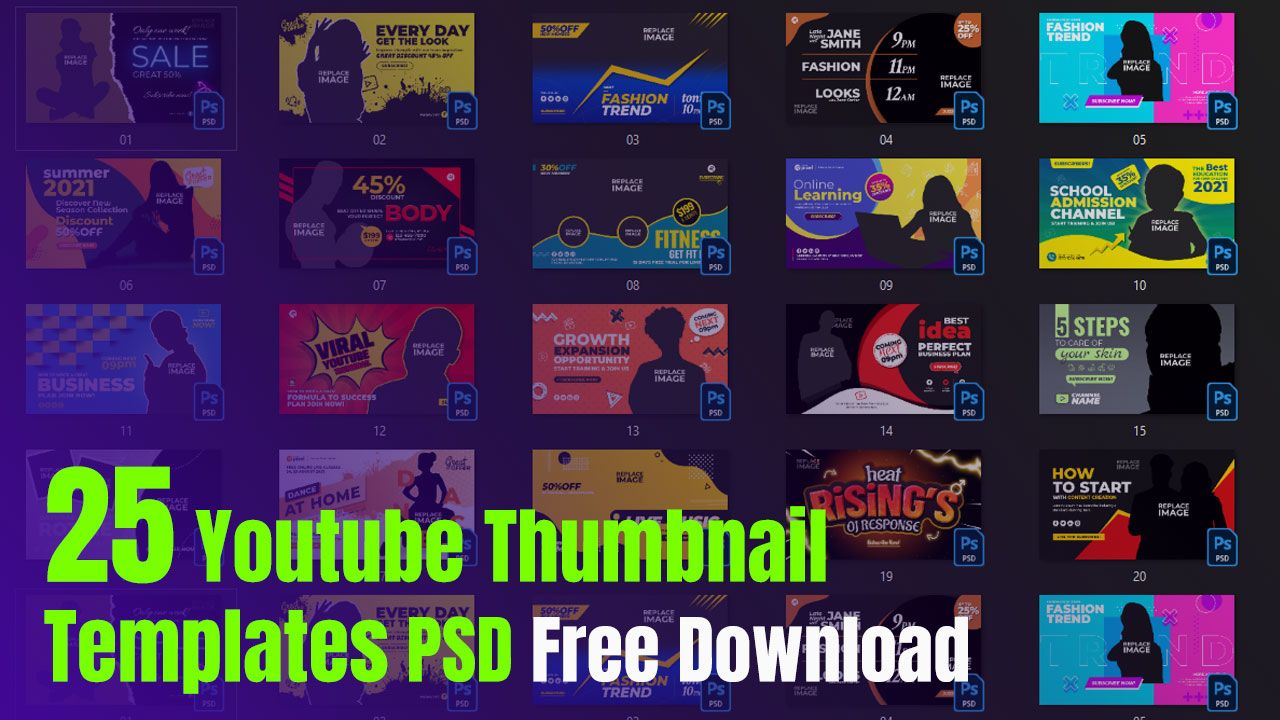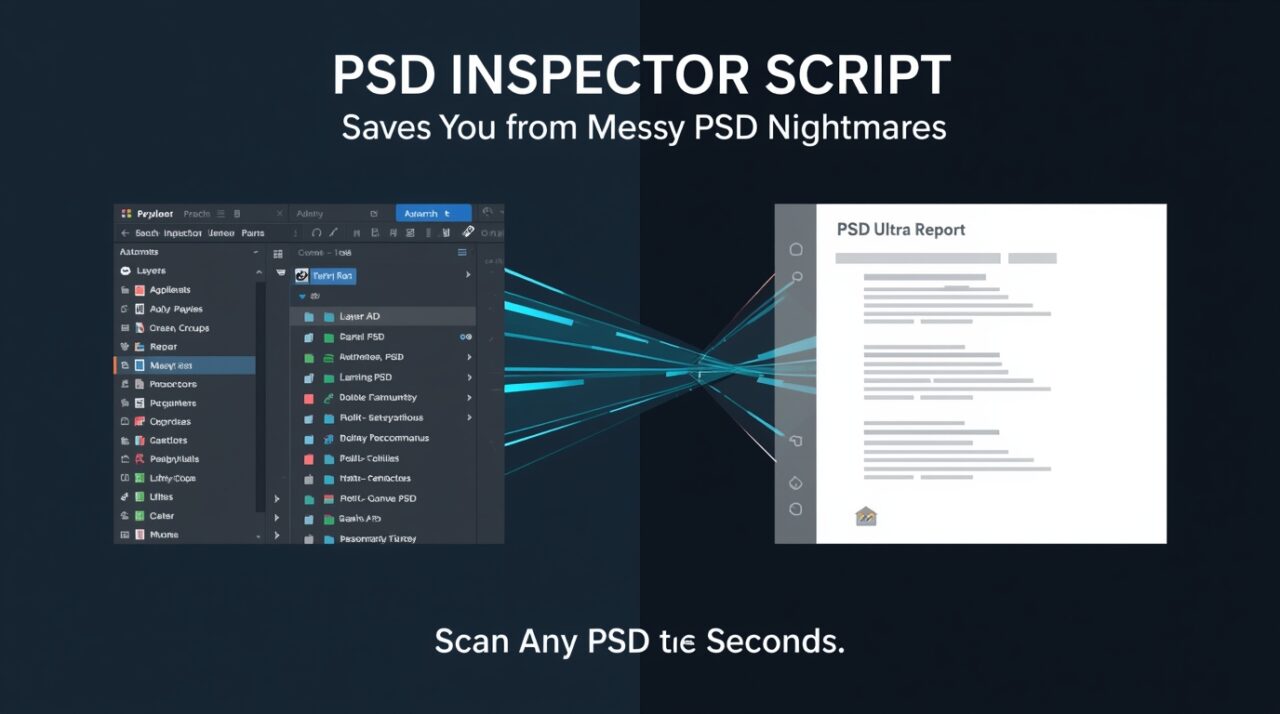Telegram Task Scam alert Google Maps Review Job Scams
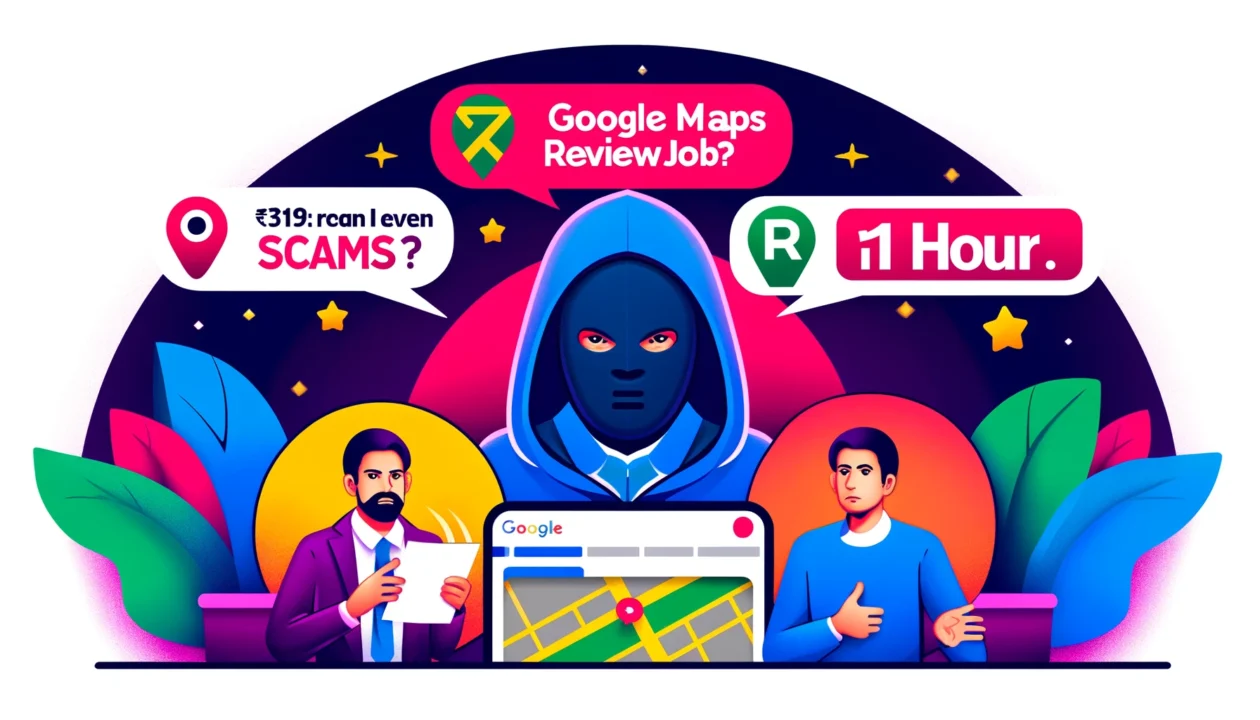
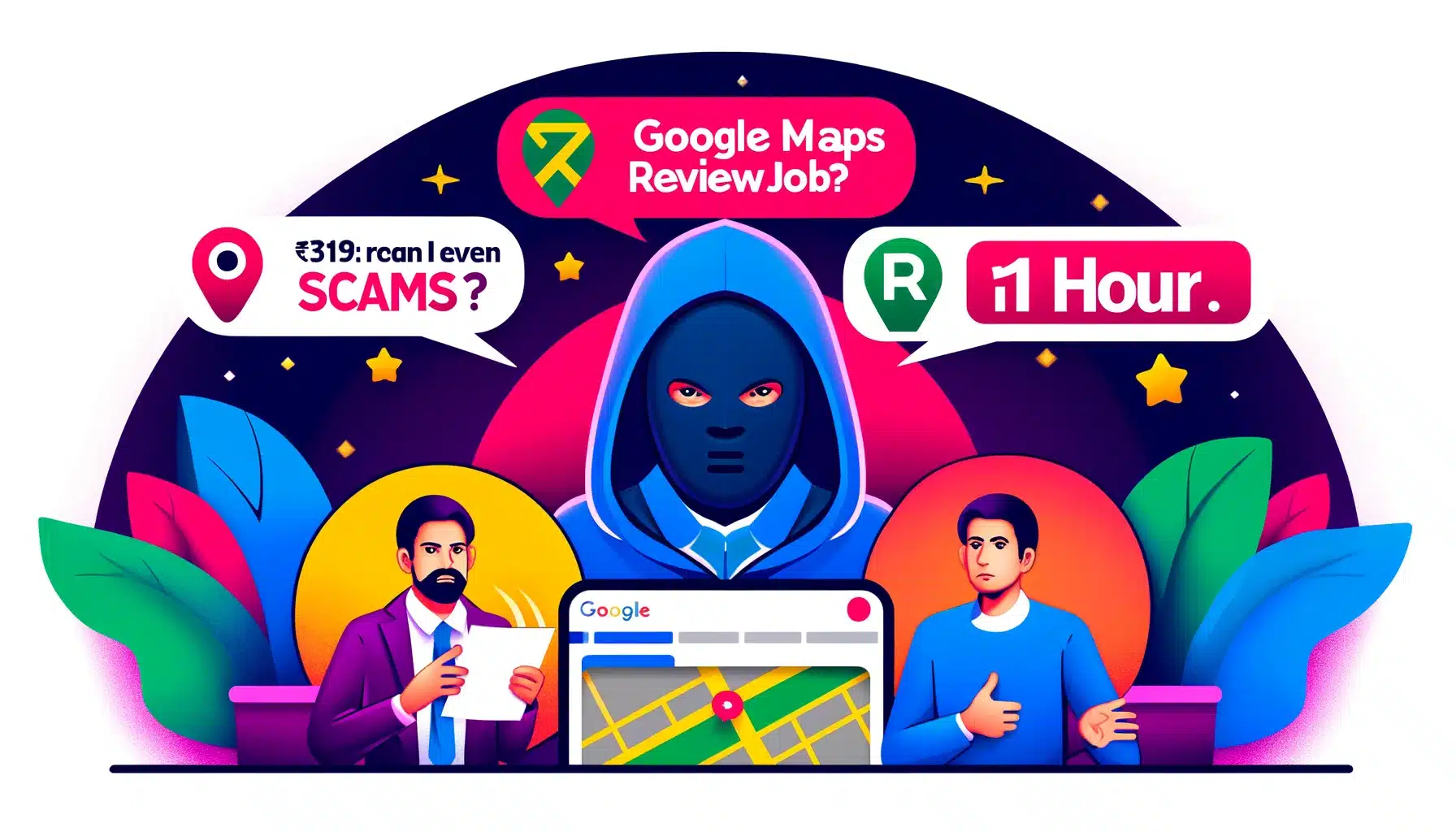
Google Maps Review Jobs have become very popular. These jobs promise quick money for doing simple tasks. These jobs are usually writing reviews for Google Maps businesses in order to increase their online visibility. This post details one of these offers, describing how I earned Rs310. The red flags that exposed it as a fraud Google Maps Review Job Scams? In sharing my experience, I hope to make people aware of the warning signs of scams and the associated risks.
I stumbled across this opportunity after receiving a WhatsApp claiming that someone was representing a reputable firm. At first, the promise of making quick cash by writing reviews seemed credible and appealing. As I looked deeper, I found some strange demands and missing information that made me doubt the offer’s reality. Do not fall for these possible scams. Be careful when looking at job offers online and be skeptical.
What Are Google Maps Review Jobs?
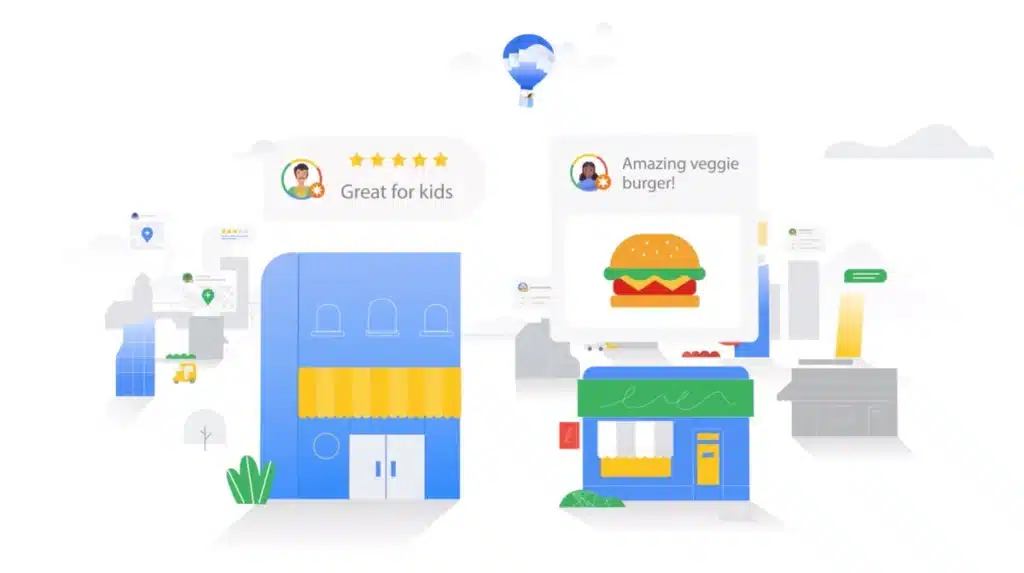
Google Maps Review Jobs are becoming more and more popular. This is mainly because they offer simple money for writing reviews. These jobs generally involve posting Google Maps reviews about businesses in order to improve their visibility and credibility online. Typically, the tasks include visiting a particular business, writing a detailed review of your visit, and then uploading it to Google Maps. The goal is for users to be influenced by reviews that seem authentic. These opportunities may not be legitimate. Some are scams.
Transparency and clarity are hallmarks of a legitimate review job. No upfront payment is required and honest, unsolicited comments are encouraged. Google Local Guide provides a good example of such a program. This program allows Google Maps users to add reviews, photos, or other content. In exchange, the user earns points that can be converted into various rewards. It is important to focus on authentic experiences and honest reviews. There are no financial transactions. Google is a big supporter of this program. It provides users with a way to contribute meaningfully to Google Maps.
Reviewing jobs that aren’t real often sends up red flags. Scammers may say they will pay a lot of money for little work or expect money upfront. Or, they might insist on feedback that is too upbeat, no matter what the experience was like. People who fall for these scams may lose money or have their personal information stolen. You need to be able to tell the difference between scams and real chances, like the Google Local Guide. Being aware of the differences will help you stay away from scams. It will also make sure that any changes you make to Google Maps are valid and add value.
Legitimate Ways to Earn Through Google Maps Reviews
1. Google Local Guide Program
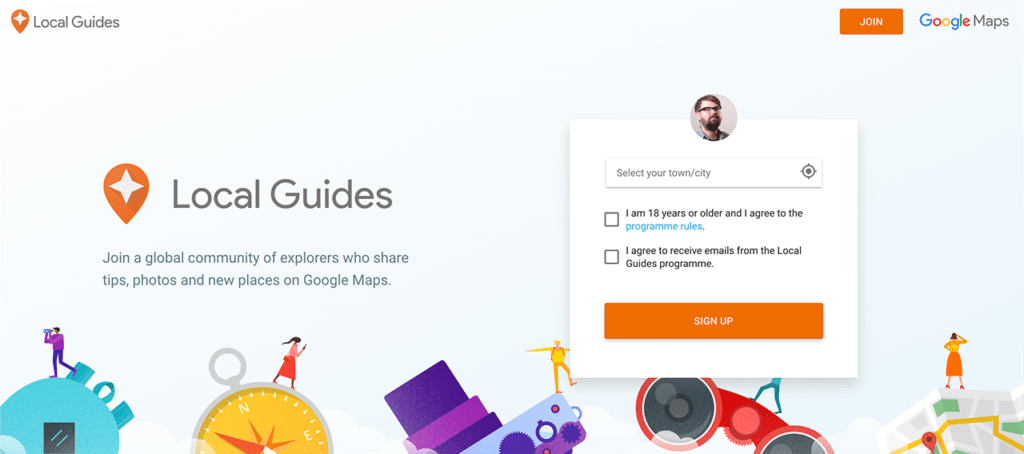
Google Local Guides is a program that was created to encourage Google Maps users to provide reviews, photos, information, and more about places visited. This program is meant to increase the amount and quality of data available on Google Maps.
- How Local Guide Works: After signing up, users can contribute reviews, photos and additional information to the Local Guide. Every contribution earns the user points.
- Earnings. Points can also be redeemed in exchange for Google services and products, including special badges.
- Benefits is a program that rewards users and improves their experience using Google Maps.
- Google Local Guide. Learn more on this page.
2. Affiliate Marketing

Affiliate marketing is where you promote products through your reviews. You can earn commissions on any sales made via your affiliate links.
- How Does Work ? Sign up to affiliate programs that are related to the services or products you will be reviewing. Include affiliate hyperlinks in your Google Maps product reviews. When someone reads a review and uses your affiliate links to purchase something, you get paid.
- Earnings. The commissions earned vary according to the affiliate program as well as the product/service being promoted. Some affiliate programs pay a percentage while others give a fixed price per sale.
- Benefits is a method that allows you to generate passive income using reviews. This is a very scalable method to monetize you content.
- Source is a source of information for affiliate marketing programs such as Amazon Associates.
3. Content marketing

Content marketing is the practice of businesses engaging individuals to write honest reviews as a part of their marketing plan. These reviews build businesses’ credibility and encourage more customers.
- How works. Businesses seeking to improve their web presence may hire you to write detailed, honest reviews about the products or services they offer. These reviews are then published on Google Maps and various other platforms.
- Earnings. Payment is usually dependent on the agreement with the client and could be determined per review or by a fixed amount each month.
- Advantages can provide a stable stream of income to businesses, and also help them enhance their online image.
- Source. You can find out about such opportunities through networking, either with businesses directly or with marketing agencies.
4. The Writing Showcase

You can use your reviews to showcase your writing ability and attract clients who are looking for content writers.
- What it Does: Write well-structured, detailed reviews that show off your ability to produce engaging and informational content. Your reviews can lead you to freelance writing jobs.
- Earnings. Your rates can be set based on the level of your experience or the complexity and size of your projects.
- Benefits
- Source is a platform that allows you to show off your skills, and attract clients.
5. Discounts, Gifts, and Promotions

Some businesses offer discounts, gifts, and other incentives in exchange for honest reviews. These rewards don’t represent direct payment but are meant to encourage customers to provide honest feedback.
- How to Use? Businesses may ask you for honest reviews of their products and services. As a way to say thank you, they might offer you freebies, discounts, or incentives.
- Earnings. Instead of cash, receive discounts for future purchases or get free products/services.
- Benefits allow you to save on products and get new ones for free.
- Source. Look for this type of opportunity through local loyalty programs or directly by contacting the businesses.
6. Freelance Review writing

Offer your review writing service on freelance platforms as a way to earn extra money.
- What it Does Create profiles in freelance platforms to offer your services. People and businesses looking for reviews that are well-written will hire you because of your expertise.
- Earnings. You can choose to set your rates by project or hourly, depending on the current market rate and your own experience.
- Benefits provide flexible working hours. You can choose the projects you want to work on.
- Source: There are many platforms to help you find freelance writing jobs, including Upwork and Fiverr.
7. Google My Business Profiles Optimized
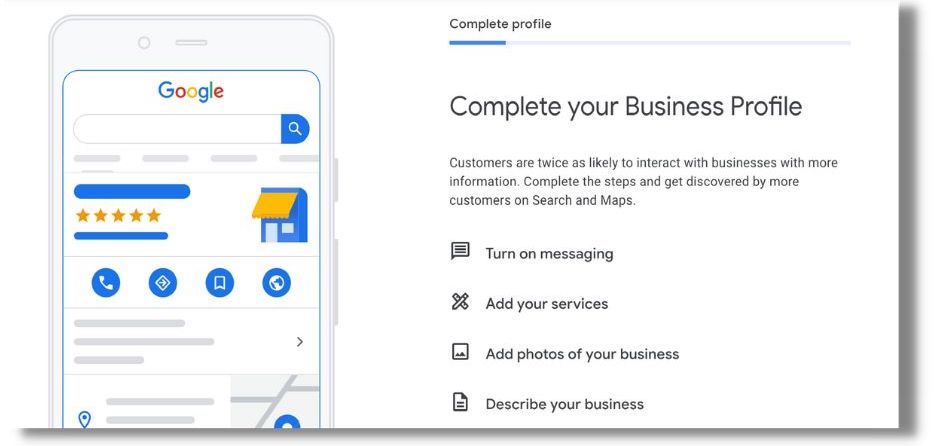
Providing businesses with assistance in optimizing their Google My Business profiles could be a lucrative business.
- How Works: Offer services that enhance business profiles with accurate information and high-quality photos. This optimization helps local businesses rank higher on search results.
- Earnings. Charge businesses a fixed fee, or monthly retainer for your SEO services.
- Benefit is a tool that helps companies attract more clients and improves their online visibility.
- source: You can market your services using platforms such LinkedIn.
By using these legal methods, it is possible to earn Google Maps ratings while also providing value to local businesses and communities. You should always make sure your reviews are honest, comply with Google’s policies, and maintain integrity to avoid penalties.
Identifying Google Maps Review Job Scams
Scams that look like Google Maps reviews can be hard to spot, especially if they are made to look real. Having to pay up front is one of the biggest red flags. Scammers usually ask for a deposit up front, saying that it’s needed to land a job or buy materials. The scammers promise high returns for this investment which never materialize. Genuine opportunities shouldn’t require you to pay upfront. It’s a big warning sign if a job requires you to pay money upfront.
Scams often promise significant earnings for minimal effort. Scams often promise huge earnings for little effort. Scams like these prey on people’s desire to make quick money. In reality, jobs that are legitimate will reward you for the time and effort you put in. Be wary of any job offers that appear to be disproportionately lucrative compared with the work required.
The lack of verifiable data is another major red flag. Legitimate businesses have a professional presence online and provide verifiable, clear contact information. Scammers on the other hand often use vague or non-existent contact information and free email services in place of official company emails. Take the time to thoroughly research any company before you commit to an online job. Visit their website and check their contact details. You can avoid scams by following these steps.
Case Study: My Experience
Roshan Roy had always been cautious with his finances, but the promise of easy money was tempting. It was the end of May 2024, and he had just received an unexpected message on WhatsApp from a number he didn’t recognize. Little did he know, this would lead him on a journey through a labyrinth of deceit.
The Initial Contact
On May 31, at 1:01 PM, a message popped up on Roshan’s phone.
“Hi. How are you?”
“Who?” Roshan replied, puzzled by the unknown number.
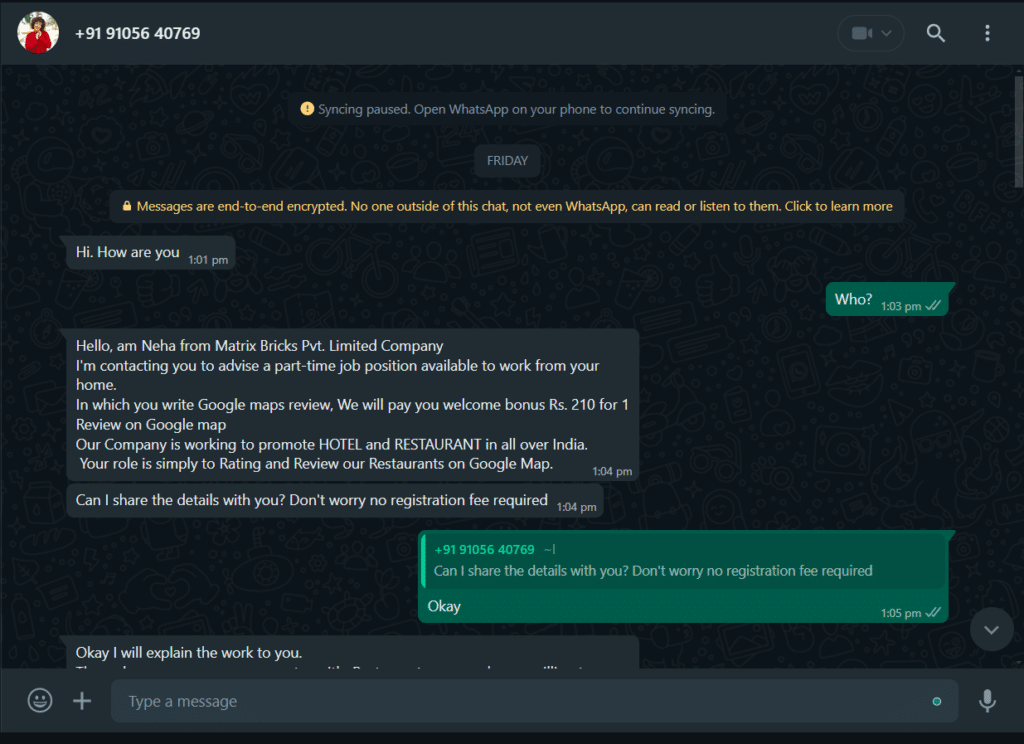
“Hello, am Neha from Matrix Bricks Pvt. Limited Company,” came the quick response. The message continued, explaining that she was reaching out to offer a part-time job that could be done from the comfort of Roshan’s home. The job involved writing reviews on Google Maps for restaurants and hotels across India, with a promise of Rs. 210 per review. No registration fee was required, which immediately caught Roshan’s attention.
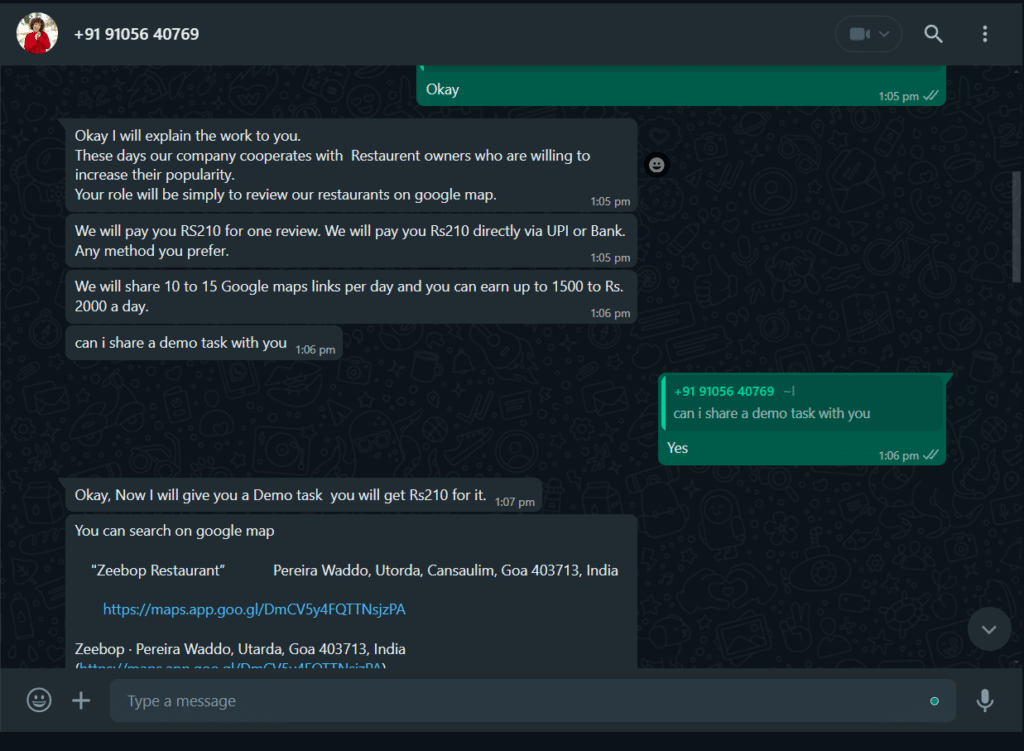
After a brief exchange, Roshan agreed to hear more about the opportunity. Neha explained the work in detail, emphasizing the simplicity and the immediate payment of Rs. 210 for each review. She assured him that the payments would be made directly via UPI or Bank transfer. To further sweeten the deal, she mentioned that he could earn up to Rs. 2000 per day by completing 10 to 15 reviews.
The Demo Task
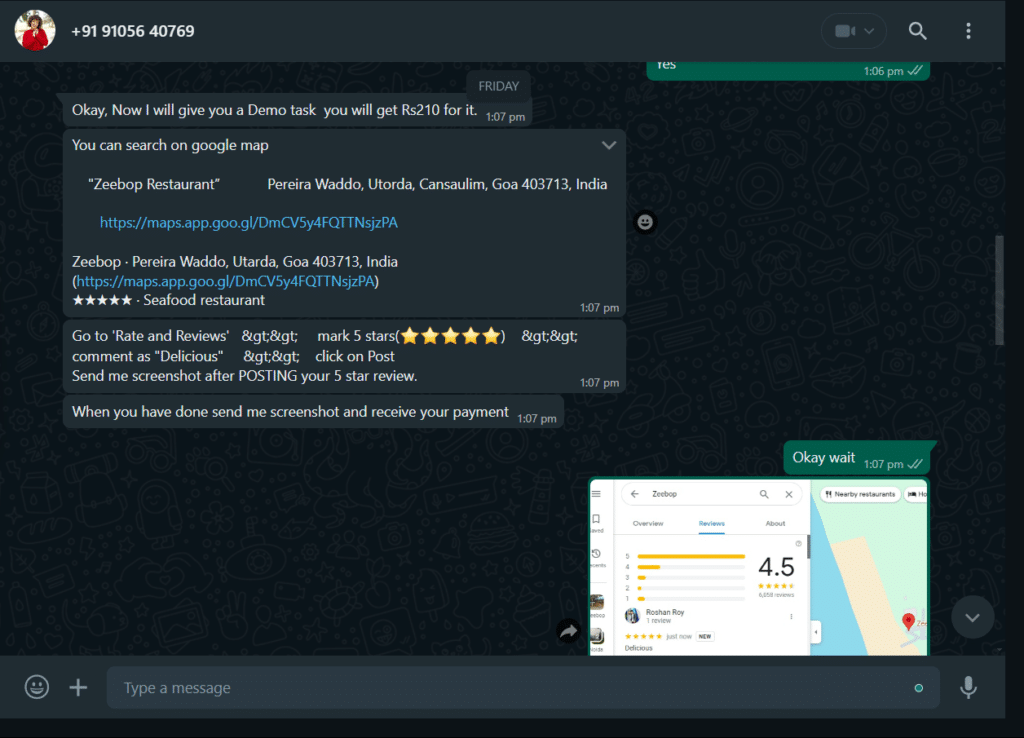
Intrigued but still cautious, Roshan agreed to try a demo task. Neha provided a Google Maps link to “Zeebop Restaurant” in Goa and instructed him to give a 5-star rating with a comment “Delicious.” Roshan completed the task and sent a screenshot as proof.
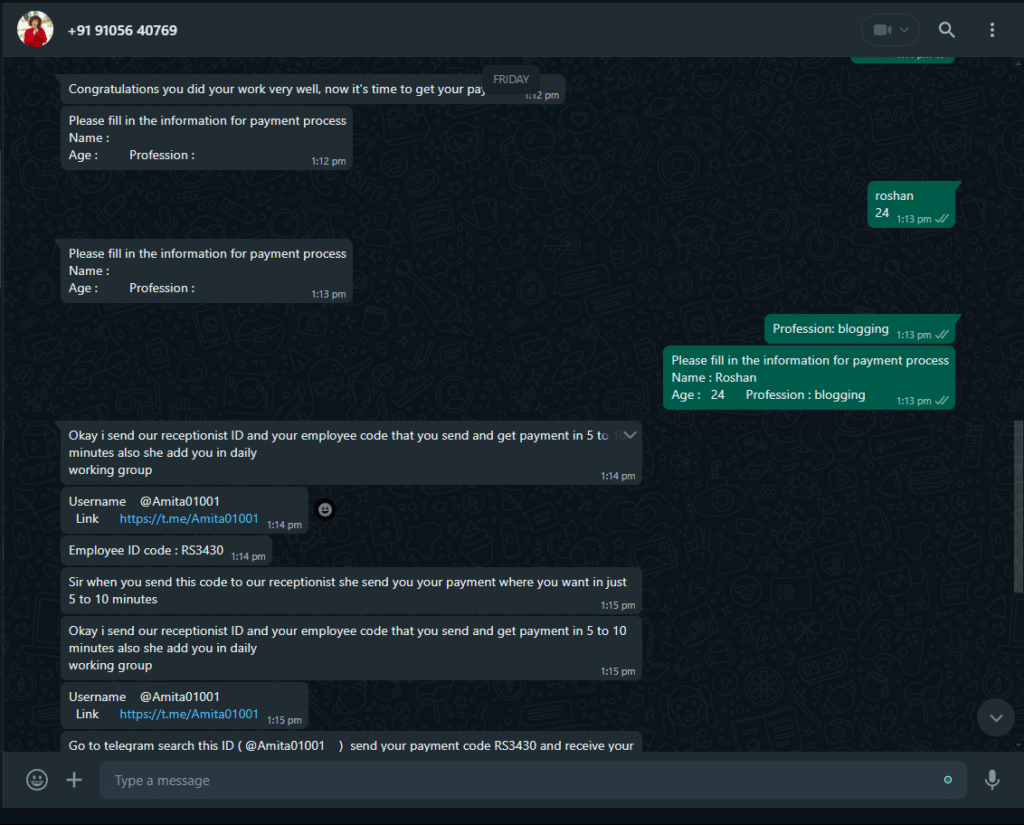
“Congratulations, you did your work very well,” Neha responded promptly. She then asked for Roshan’s personal details to process the payment: his name, age, and profession. Roshan provided the information, and within minutes, he received Rs. 210 in his bank account. The immediate payment boosted his confidence in the legitimacy of the job.
Transition to Telegram
Neha then directed Roshan to contact their receptionist, Amita Rajput, on Telegram using the provided link and employee code: RS3430. Roshan followed the instructions and soon found himself in a conversation with Amita.
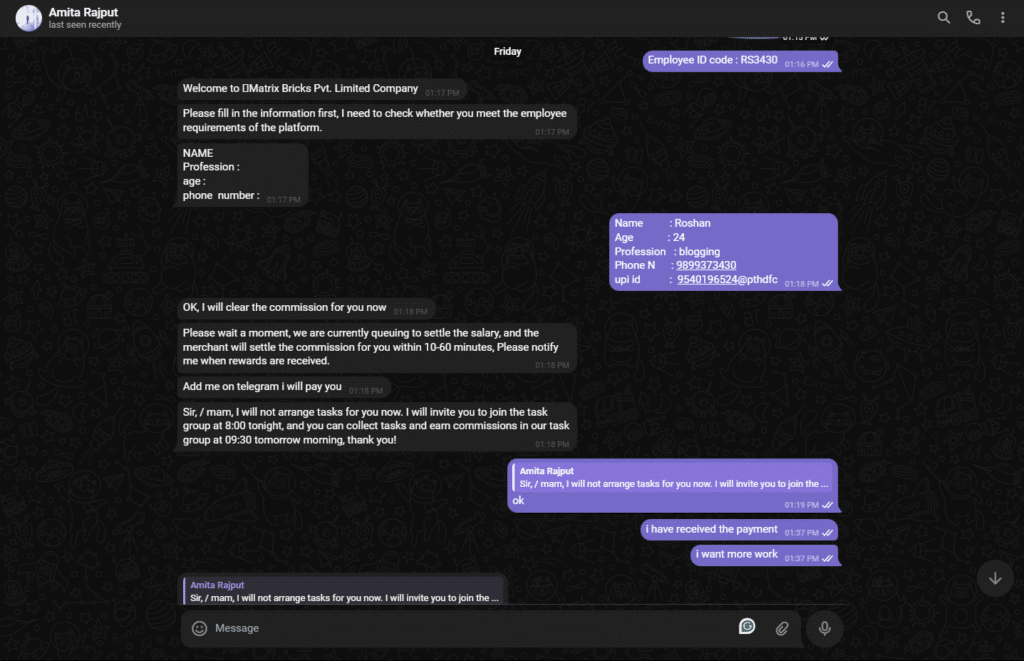
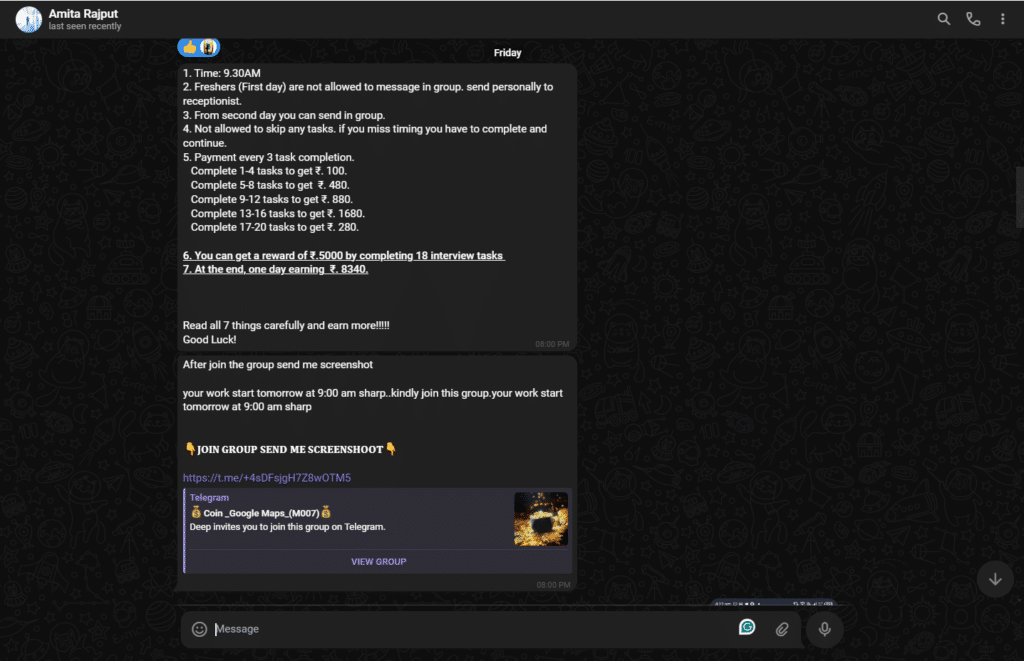
“Welcome to Matrix Bricks Pvt. Limited Company,” Amita greeted him. She asked for the same personal details again to verify his employee status and to process future payments. Roshan complied, and Amita informed him that he would be added to a daily working group where tasks would be assigned.
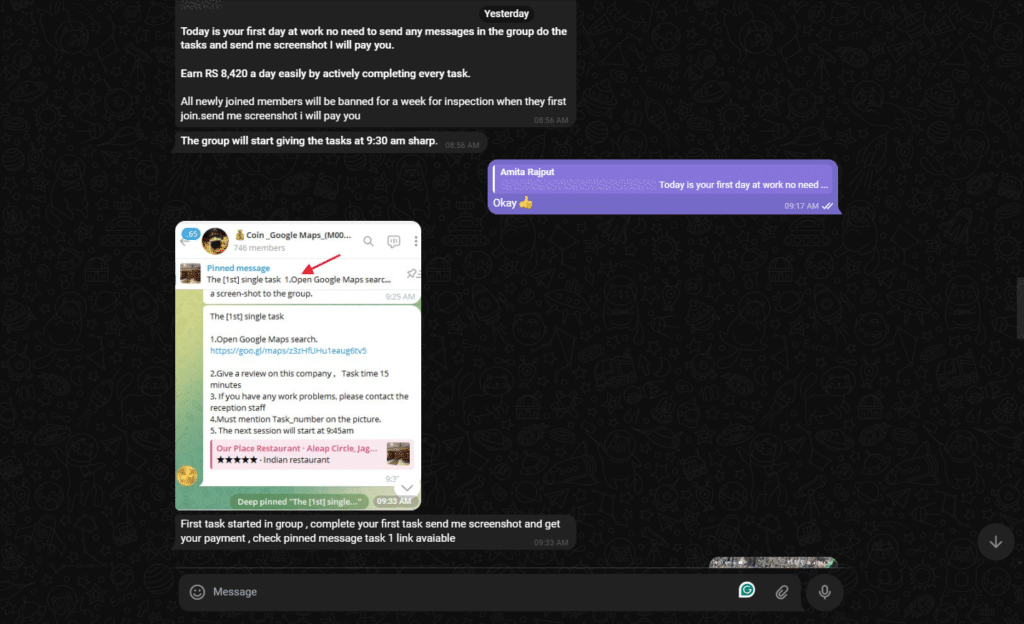
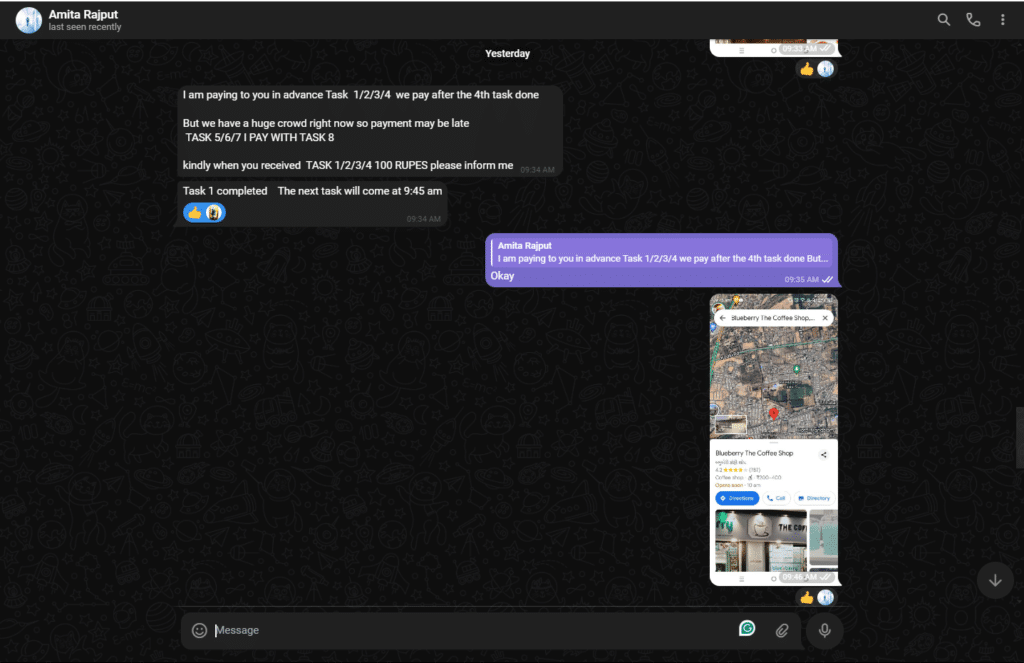
The next morning, Roshan received a message reminding him to join the group at 9:30 AM sharp. The tasks began rolling in, each one requiring a Google Maps review, just like the demo task. Roshan diligently completed each task and sent the screenshots to Amita, who assured him that payments would be processed after the completion of every four tasks.
The Work Assessment
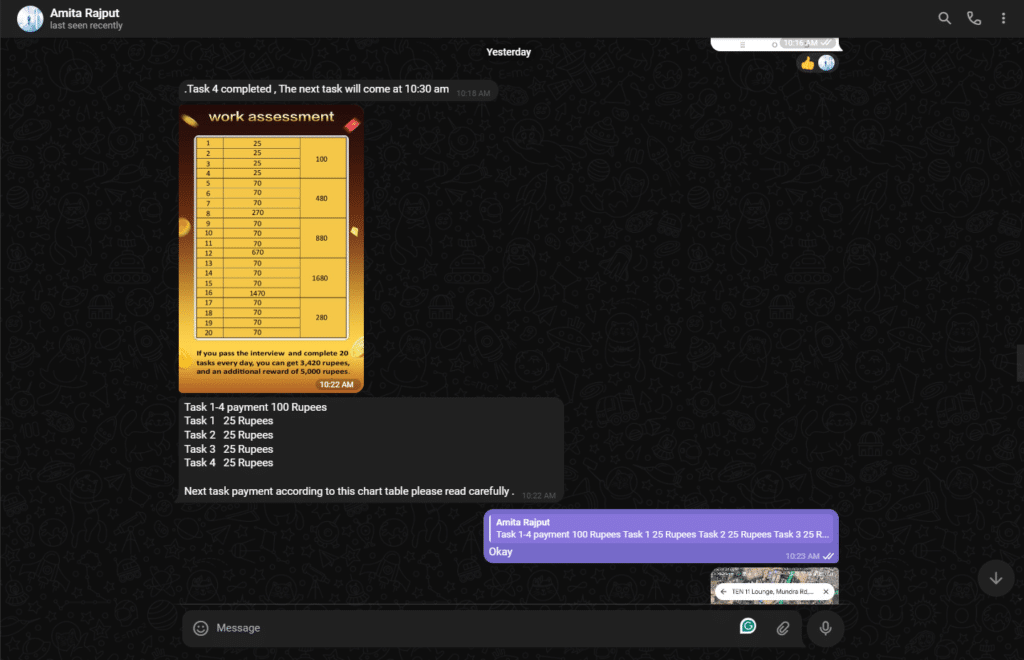
As Roshan completed his tasks, he noticed the payment structure outlined by Amita. The initial tasks paid small amounts, but the promise of higher earnings was tempting. The table provided by Amita showed incremental payments for completing more tasks, with the potential to earn up to Rs. 8340 in a single day if all 20 tasks were completed. Additionally, completing 18 interview tasks would yield a reward of Rs. 5000.
Roshan completed the first four tasks and received Rs. 100. The tasks continued, and he received payments as promised. However, the structure became more complex with each task. The payments increased, but so did the number of tasks required to receive the payout.
The Red Flag
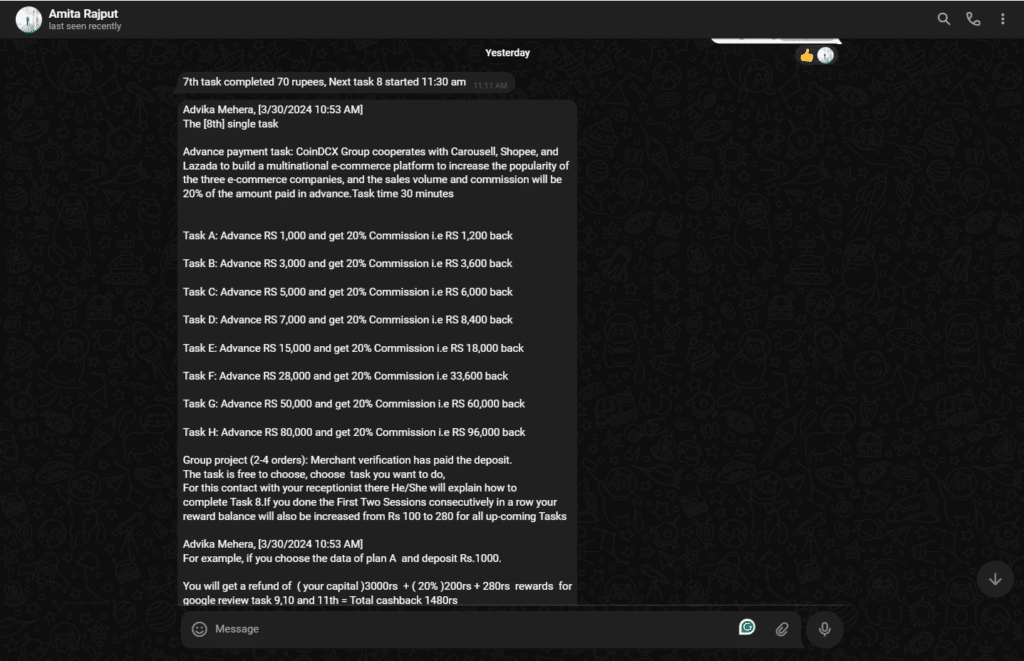
On the eighth task, things took a turn. Amita introduced a new type of task that involved making an advanced payment for a higher return. The tasks were now tied to a supposed cooperation with CoinDCX, a well-known cryptocurrency exchange, and involved making deposits with promises of a 20% commission return.
Amita presented several plans, ranging from Rs. 1,000 to Rs. 80,000, each offering a 20% commission. For example, advancing Rs. 1,000 would yield a refund of Rs. 1,200 plus an additional reward, totaling Rs. 1,480. She explained that completing these tasks would significantly boost his earnings.
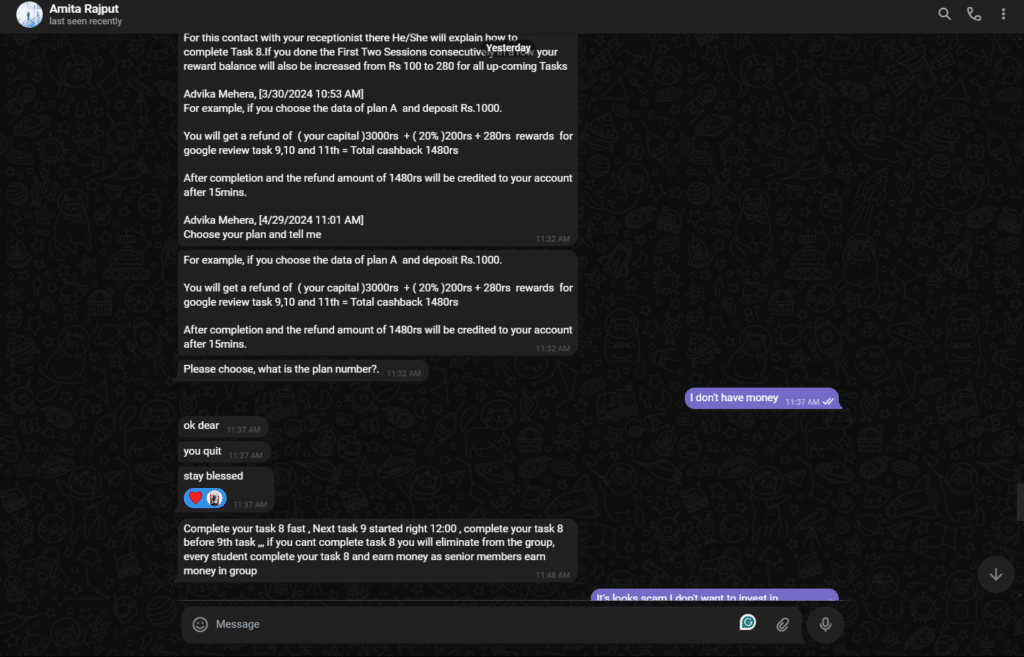
Roshan was immediately skeptical. The request for an advanced payment was a classic red flag for scams. He expressed his concern to Amita, stating that he didn’t have the money to invest. Amita’s response was dismissive and pushy, trying to pressure him into making the payment.
“You quit,” Amita said curtly when Roshan refused to comply. “Stay blessed.”
Unveiling the Scam
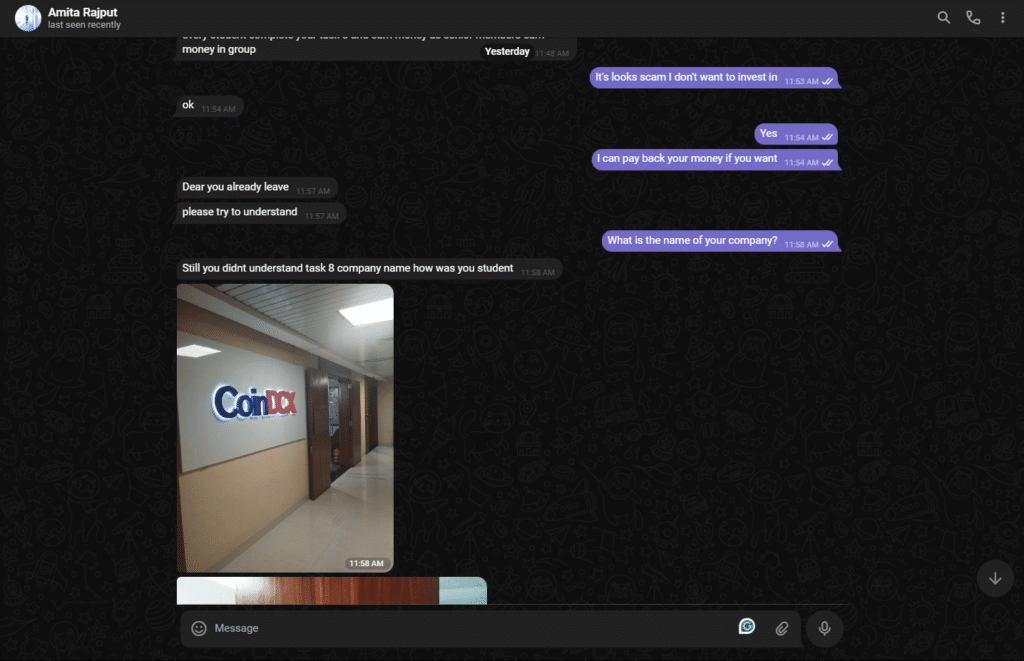
Determined to uncover the truth, Roshan asked for more information about the company. Amita’s responses became increasingly defensive and vague. She avoided answering direct questions and instead tried to divert Roshan’s attention back to completing the tasks.
Roshan decided to do some research on his own. He looked up CoinDCX and found that while it was a legitimate company, there was no mention of any cooperation with Matrix Bricks Pvt. Limited Company. The use of CoinDCX’s name was likely a ploy to lend credibility to the scam.
Roshan confronted Amita once more, stating outright that the operation seemed like a scam. Her reaction confirmed his suspicions. “Now you out from the group,” she said. “Stay blessed.”
Reporting the Scam
Having gathered sufficient evidence, Roshan took steps to report the scam. He documented the entire conversation, screenshots of the tasks, payment proofs, and the request for advanced payments. He reported the WhatsApp number and Telegram ID to the respective platforms, providing all the evidence he had collected.
Reflection
The experience left Roshan wary but wiser. He had narrowly escaped losing money to a sophisticated scam that preyed on people’s desire for easy money. The initial payments were a clever tactic to build trust, making the advanced payment request seem like a logical next step.
Roshan’s vigilance and skepticism had saved him from falling deeper into the trap. He realized the importance of questioning too-good-to-be-true offers and conducting thorough research before engaging in any online transactions.
A Closer Look at the Scam
Scammers often operate with a high level of sophistication, and the one Roshan encountered was no different. The scam was meticulously crafted to build credibility and trust gradually. Here’s a deeper dive into how it unfolded and why it was so convincing.
Building Trust Through Small Payments
The initial tasks and payments were designed to build trust. By paying small amounts promptly, the scammers made Roshan believe that the operation was legitimate. This technique, known as “social proof,” leverages the psychological tendency of people to follow the actions of others when they see positive outcomes.
Roshan’s receipt of Rs. 210 for the first task, followed by Rs. 100 after completing the next four tasks, was a calculated move. Each payment reinforced his belief that the job was real and that the company was trustworthy. The gradual increase in tasks and payments created an illusion of legitimacy and reliability.
Escalation to Larger Sums
Once trust was established, the scammers introduced tasks that required larger sums of money. The promise of a 20% return on advanced payments was enticing. The detailed payment chart and structured task schedule added to the illusion of a professional operation.
The use of CoinDCX, a known and reputable cryptocurrency exchange, was a clever tactic. By associating with a well-known brand, the scammers aimed to further solidify their credibility. The fake CoinDCX partnership was a critical element in persuading victims to make larger payments.
Psychological Pressure and Manipulation
The scammers employed various psychological tactics to pressure Roshan into compliance. Amita’s dismissive and curt responses when Roshan expressed skepticism were intended to create a sense of urgency and fear of missing out. The insistence on completing tasks promptly and the threat of being removed from the group were strategies to keep him engaged and compliant.
The promise of significant rewards for completing a series of tasks created a powerful incentive to continue. The detailed task schedule and payment increments made it seem like a structured and achievable goal, further motivating Roshan to stay involved.
Red Flags and Realizations
Despite the sophisticated setup, there were several red flags that Roshan eventually recognized:
- Request for Advanced Payments: Legitimate companies do not ask employees or freelancers to pay money upfront to receive payment for their work.
- Vague and Evasive Responses: When Roshan asked for more details about the company and the tasks, the responses became vague and evasive. This is a common tactic used by scammers to avoid scrutiny.
- Pressure to Act Quickly: Scammers often create a sense of urgency to prevent victims from thinking critically or seeking advice. The constant pressure to complete tasks and make payments quickly was a significant red flag.
- Too Good to Be True: The promise of high returns for minimal effort is a classic hallmark of scams. The potential earnings were disproportionately high compared to the effort required, which should have raised suspicion.
Aftermath and Lessons Learned
Roshan’s decision to step back and critically evaluate the situation saved him from a substantial financial loss. He learned several valuable lessons from the experience:
- Trust but Verify: It’s essential to verify the legitimacy of any online job offer or financial opportunity. Research the company, read reviews, and seek information from reliable sources.
- Beware of Advanced Payment Requests: Legitimate companies will never ask for advanced payments to secure a job or task. Any such request should be a significant red flag.
- Stay Skeptical of High Returns: Offers that promise high returns with minimal effort are often too good to be true. It’s important to approach such offers with a healthy dose of skepticism.
- Report Suspicious Activity: Reporting scams to relevant authorities and platforms can help prevent others from falling victim. Sharing personal experiences can raise awareness and contribute to a safer online community.
Roshan’s story serves as a cautionary tale in the digital age. Scammers are becoming increasingly sophisticated, using a mix of real and fabricated information to lure victims into their traps. The experience underscores the importance of vigilance, critical thinking, and skepticism when navigating online opportunities.
By sharing his experience, Roshan hopes to raise awareness and prevent others from falling victim to similar scams. His story is a reminder that while the internet offers countless opportunities, it also harbors risks that require careful navigation. Stay informed, stay cautious, and always trust your instincts.
How to Earn from This Scam
While engaging with scammers is not advisable due to ethical and legal implications, understanding how their tactics work can be useful. The initial stages of this scam involve building trust by providing small, seemingly legitimate tasks and making upfront payments. Here’s a step-by-step explanation of how you could theoretically earn some money from this scam without getting deeply involved.
Step 1: Initial Contact
When you receive an unsolicited message from a scammer claiming to offer a part-time job opportunity, respond positively. In this case, the scammer, Neha, claims to represent Matrix Bricks Pvt. Limited Company offers a part-time job writing reviews for Google Maps in exchange for Rs. 210 per review.
Express interest in the job. The scammer will provide details about the role, such as writing positive reviews to boost the popularity of restaurants on Google Maps.
Step 2: Accept the Demo Task
The scammer will give you a demo task to post a five-star review for a specific restaurant on Google Maps. Follow these steps:
- Search for the restaurant on Google Maps.
- Post a five-star review with the comment “Delicious” as instructed.
- Take a screenshot of your posted review and send it to the scammer as proof.
Upon receiving your proof, the scammer will process the payment for the demo task. You should receive Rs. 210 as promised. This initial payment is designed to build trust and encourage you to continue engaging with the scam.
Step 3: Receive Subsequent Tasks
After successfully completing the demo task, the scammer will add you to a Telegram task group where you will receive more tasks. The group will have strict rules, such as not posting messages on the first day and completing tasks within specific time frames.
You will be assigned four more tasks, each worth Rs. 25, for a total of Rs. 100. These tasks typically involve similar actions to the demo task, such as posting reviews on Google Maps.
Step 4: Simplify the Task Completion
Instead of genuinely completing the tasks, you can take shortcuts:
- Click on the Google Maps links provided for the tasks.
- Take screenshots of the restaurant listings without actually posting any reviews.
- Send these screenshots to the scammer as if you have completed the tasks.
Since the scammers are focused on building trust during the initial stages, they may not scrutinize the proof too closely. They aim to lure you deeper into the scam with promises of more significant earnings.
Step 5: Receive Additional Payment
Once you have submitted the screenshots for the four tasks, the scammer should process the payment for these tasks. You will receive an additional Rs. 100, bringing your total earnings to Rs. 310.
Step 6: Avoid Further Involvement
After receiving the payments, it is crucial to avoid any further engagement with the scammers. The scam’s risk increases when they start asking for upfront payments for advanced tasks. These tasks promise high returns but require you to send money first, which is the core of the scam.
Recognize the red flags and cease all communication with the scammers at this point. By stopping here, you prevent any potential financial loss and protect yourself from more severe consequences.
While it is possible to earn a small amount from the initial phase of this scam, doing so involves ethical and legal risks. The safest and most responsible course of action is to report the scam to the appropriate authorities and avoid engaging with scammers altogether. By understanding their tactics, you can better protect yourself and help prevent others from falling victim to such schemes.





